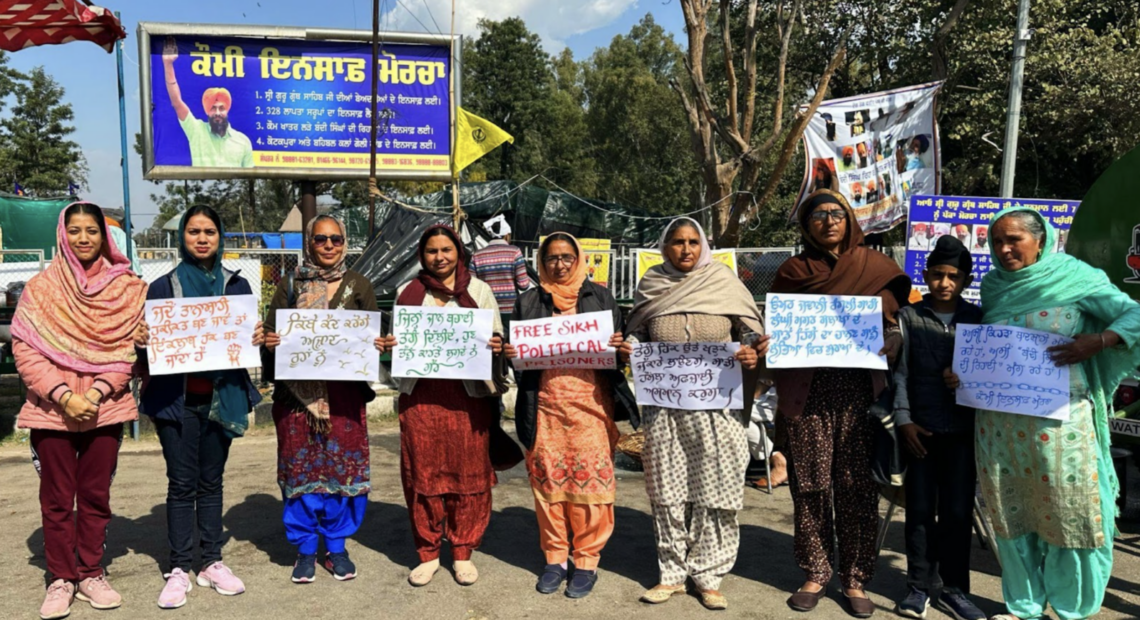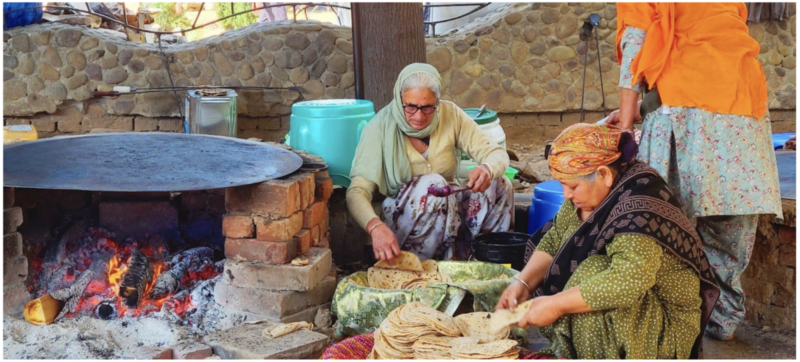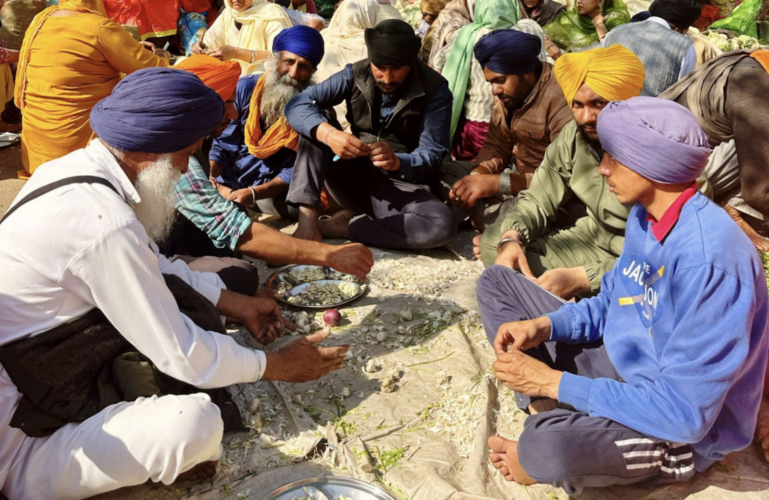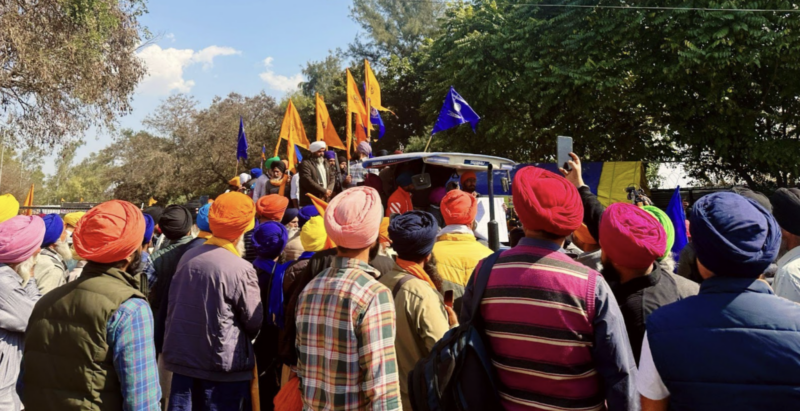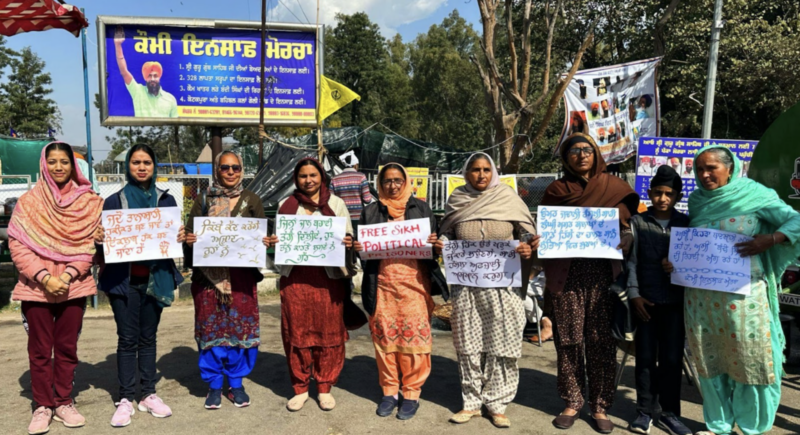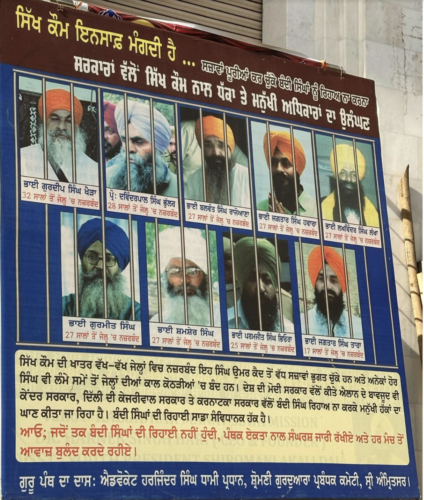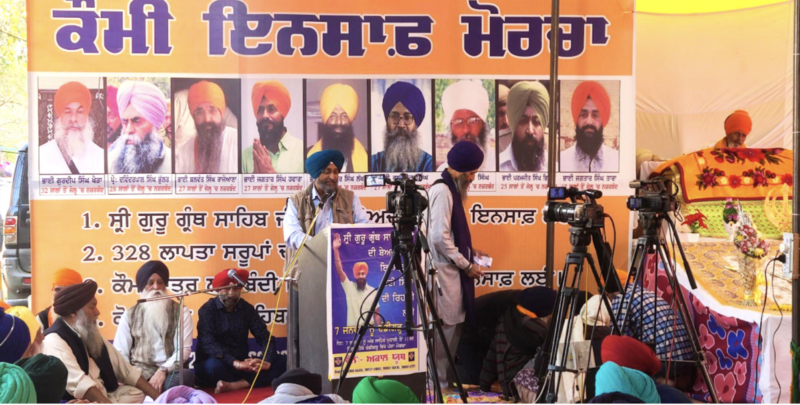by Japleen Kaur
Content note: Mentions of violence and sexual assault.
Introduction by Lakhpreet Kaur: In Punjab, India on January 7, 2023, with the name of Qaumi Insaaf Morcha (Sikh Nation Justice Protest) various Sikh organizations started a protest for the release of Sikh prisoners who have completed their sentences. The issue of their release has been a central issue for Punjabis for some time but recently, political parties and organizations have highlighted the matter.
The Shiromani Gurdwara Parbandhak Committee has formed a list of 21 Sikh prisoners who are yet to be released. However, the focus of the Qaumi Insaaf Morcha is on nine prisoners who have already completed their sentences – which were anywhere from 15 to 31 years in jail.
Delhi based writer and creative, Japleen Kaur, shares a perspective about the protest and writes about the involvement of Kaurs:
In the last two years, Sikhs’ spirit for justice has been invigorated – as seen first at the Kisan Morcha (farmers protest) spearheaded by Punjabis in 2021. And now, at the Qaumi Insaaf Morcha, a protest for the release of prisoners who are still incarcerated in spite of having fully served their sentences.
Background
Since the 1947 Partition of Punjab, Punjabis and Sikhs have clamored for state-rights and religious rights, but have been met with resistance from the Central Indian Government. This struggle is often remembered by the activism of the 1970s and 1980s culminating in the 1984 anti-Sikh violence. During this time, many Sikhs were imprisoned. Today, despite having served their complete sentences, some are still being unlawfully held. This is the central issue of the morcha.
2012
The issue of Sikh prisoners, or Bandi Singhs, has been simmering for a long time. Most recently massive protests erupted across Punjab by Sikhs in March of 2012 against the impending hanging of Balwant Singh Rajoana. (Balwant Singh Rajona was charged with the murder of Beant Singh. Beant Singh was a former Chief Minister of Punjab during whose tenure upwards of twenty-five thousand of Sikh civilians disappeared or were killed by the police in extrajudicial executions.) The public protest against Rajoana’s hanging forced the State to commute his hanging to a life sentence.
2013
The success of these protests laid the foundation for Gurbaksh Singh Khalsa, a farmer and Sikh activist from Kurukshetra, to go on a 44-day hunger strike at Gurdwara Amb Sahib in Mohali in 2013, demanding the release of other Bandi Singhs. His hunger-strike further resulted in a groundswell for demands for the release of Sikh prisoners across Punjab as many human rights organizations and Sikh activists petitioned the Indian Central Government for the cause. The government did not respond to any activism.
2019
On the occasion of the 550th Prakash Utsav (birth anniversary) of Guru Nanak Sahib in 2019, the Punjab Government announced they would release 550 Sikh political prisoners as a good-will, humanitarian gesture towards the Sikh community. However, till date, no action has been taken. Many families and those in the community felt this was a betrayal of trust and it added to a growing sentiment of injustice.
2023
On January 7, 2023 various Sikh organizations started a protest for the release of Sikh prisoners who have completed their sentence. The issue of their release has been a central issue for Punjabis for some time but political parties and organizations have recently highlighted the matter.
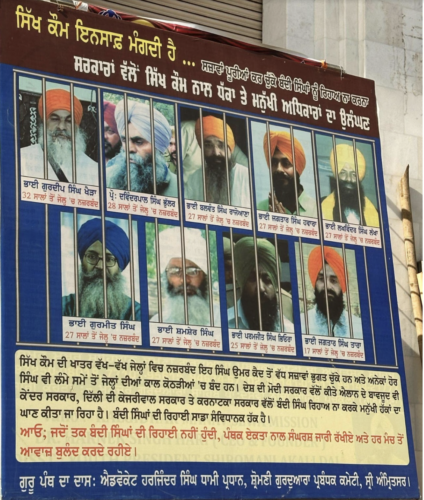
With the name of Qaumi Insaaf Morcha (Sikh Nation Justice Protest) they gathered at the historic Amb Sahib Gurdwara in Mohali, Punjabi near the Mohali-Chandigarh border. From here they marched towards Chandigarh with the intention of taking their protests to the residences and offices of government officials and administrators. However, they were stopped by the Chandigarh Police at the border.
The protestors, seeing that they had no peaceful means to march into the city, decided to stay put where they had been stopped, and a pakka morcha (sit-in/semi-permanent protest) was launched; tents were put up, community kitchens were raised, and first-aid centers were established in a bid to continue their protests indefinitely at that very site.
In anticipation of the march, the Chandigarh and Mohali administrations deployed a number of police personnel for security arrangements at the border. Police trucks were parked around the site and barricades draped with barbed wire were erected to prevent the protesters’ entry into the city. Anti-riot vehicles and water cannons were also deployed at the Chandigarh-Mohali border.
Support
It has been over a month now, and the resolve of the community has only gained momentum with an even larger number of supporters from across the state flocking and joining the protests. The number of supporters appears to be growing by the day, all determined to carry on the struggle until their demands are met.
The morcha has garnered support from Nihangs, representatives of many other Sikh organizations, almost all the farm groups (irrespective of their diverse ideological moorings), many activists, and several other groups.
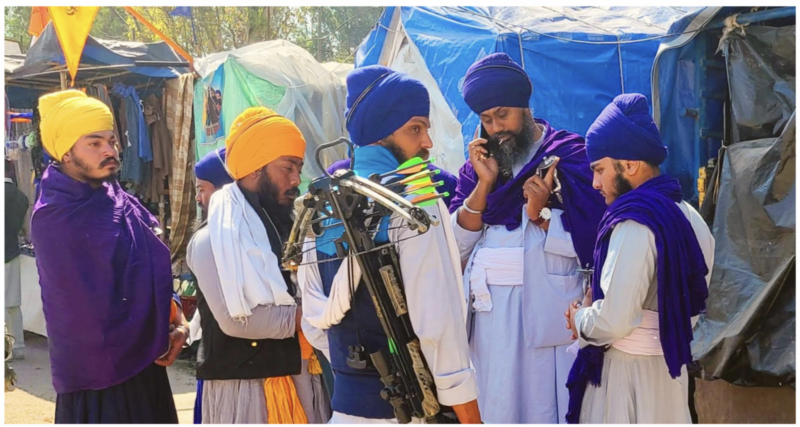
Kaurs
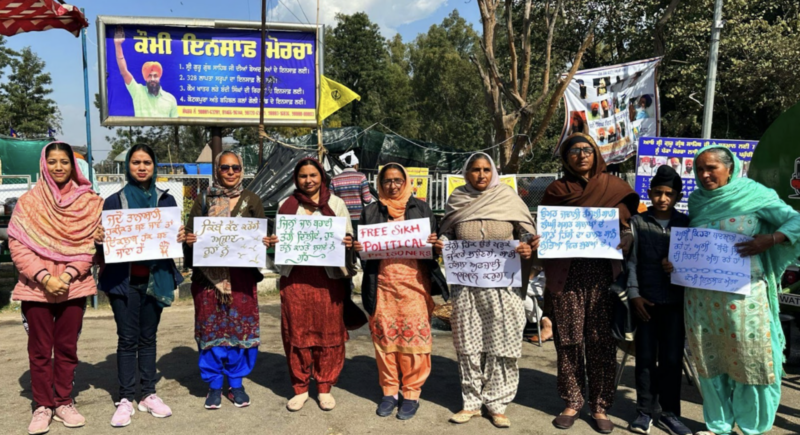
However, the most noteworthy group of protesters is the sizable participation of Kaurs who have been peacefully protesting, much in the same spirit that mobilized them to join the now-world-famous protests against the three central farm laws (since repealed), more than a year ago at the Delhi borders.
In the true historical traditions of the community, the Kaurs have been a major part of all these protests, refusing to be left behind. Throughout the day, they provide seva by preparing langar, and ensuring that the space is kept tidy and clean. Singhs assist them with everyday tasks like cooking, cleaning, and laundry.
When I spoke to a number of them, they all said in unison that Sikh sentiments were already hurt for over a decade and any “further delay in the release of the detainees will only send a stronger negative message to the Sikh community.”
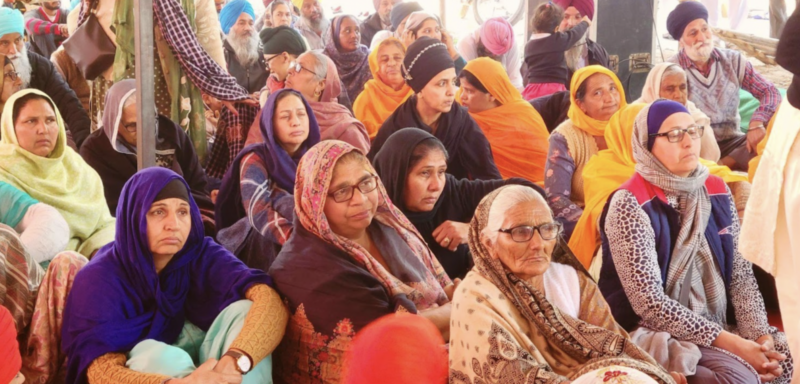
Bibi Charan Kaur
Many prominent Kaurs are also part of the protests. Late Punjabi singer Sidhu Moosewala’s mother, Bibi Charan Kaur (from Moosa district and who also happens to be the sarpanch (leader) of the village council), joined the protests along with a group from Moosa District. She spoke at length about the importance of, “supporting and carrying on with the ongoing protests,” and recalled how she was enthusiastically encouraged by the people from her village to travel to the protest site to further highlight the cause. She was accompanied by many other women from her village.
While vociferously supporting the cause of the protest during her speech she also lamented, with teary eyes, that “had the government of the day been more sensitive to the truths espoused in the songs of her son the situation would have been much better,” and things would not have deteriorated to the level of people protesting on and blocking the roads. (Late Sidhu Moosewala became a legend during his lifetime due to his hard-hitting and thought-provoking lyrics).
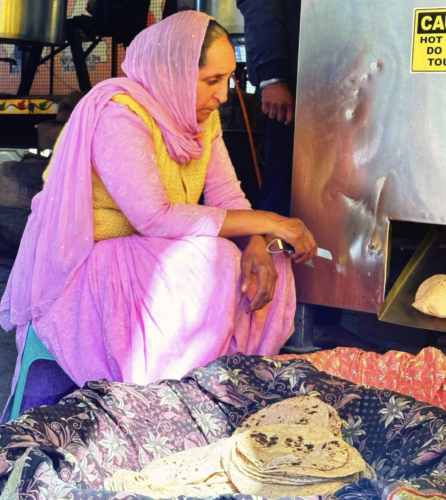
Bibi Amarjeet Kaur
Amarjeet Kaur (56, Mansa) while preparing parshaadas, shared her poignant memories that after the horrific massacre of 1984 many “young Sikh boys were angry” and took the law into their own hands as they had witnessed the burning of dozens of gurdwaras, their young brothers dragged from their homes and burnt alive, and their sisters gang raped.
Mai Bhago Jatha
Another group of activists, the Mai Bhago Jatha from Anandpur Sahib, was serving at a seva stall. Their chief, Dyal Kaur, remarked that as ordained by Guru Nanak Sahib Ji Himself, women too have equal status, citing the shabad ਸੋ ਕਿਉ ਮੰਦਾ ਆਖੀਐ ਜਿਤੁ ਜੰਮਹਿ ਰਾਜਾਨ. Hence, there was “no reason why women should not be part of this noble deed, indeed!” Members of the organization stated that they offer ardas to Akal Purakh on a daily basis for the release of political prisoners so that they can meet their aging parents and other family members who have been waiting for them for years, lead a normal life, and be free from political vendetta or government apathy.
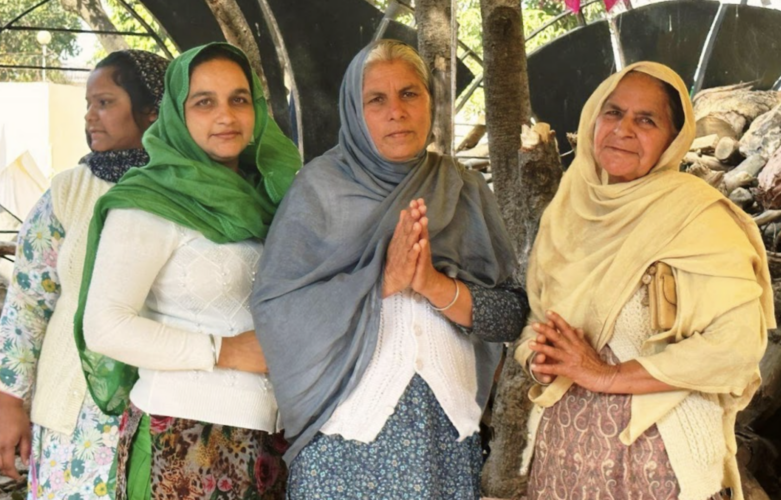
Balwant Kaur
Balwant Kaur (65, Sangrur) was present at the morcha along with her other family members. One of her family members informed me that she had undergone heart surgery just four days prior, but she wanted to be part of the protests despite her medical condition. She said, “The stubbornness of the government will only be matched by our own jazba (passionate fervor).” And that just as the “farmers had won the battle of their rights,” the same will happen here, again. “We will not return to our homes without getting justice.” The family of the Kaur has even donated their dasvandh (a donation of 10% of their earnings) to the organizing committee of protest.
Kamalpreet Kaur Khalsa
According to another energetic Kaur at the protest site, Kamalpreet Kaur Khalsa, who is a teacher by profession, there are a lot of Sikh political prisoners who are languishing in various jails of the country despite having completed their prison term. Many of Sikh prisoners have been in jail for the last 24-30 years, she said. Many protestors note that sentences are typically only 14 years.
Challenges
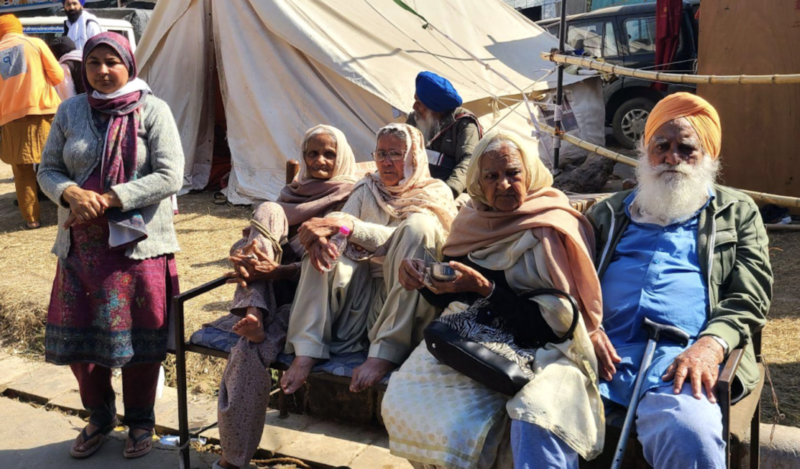
Just like at the farmers protest, women have faced many problems here also. For instance, women are struggling with sanitation, being forced to use the toilets of nearby temples, the homes of strangers, or secluded places.
In addition, a few days ago, the police used water cannons on the demonstrators during a clash between protestors and the police. In the harsh winter, this caused additional difficulties for the women.
But, in spite of these issues, they “will not back down from the protest,” said one woman. Despite everything, the Kaurs are committed to remain at the protest, no matter what.
No power could stop us from fighting for our brothers
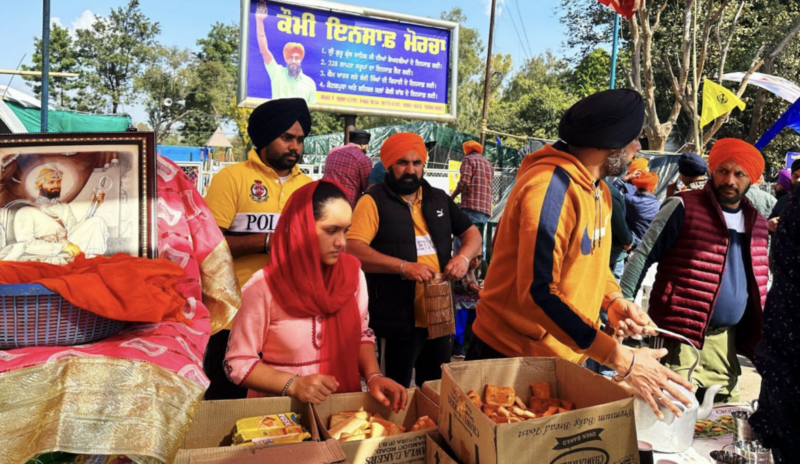
I asked another set of women, performing seva in different groups, their opinion on the morcha and other Sikh or Punjabi issues. They recalled the farmers protest of 2021 and with zest exclaimed, “Though the farmer movement was not a religious issue or even a Sikh cause, the highly visible and active participation by the Sikh community infused the year-long protests with the indomitable Sikh spirit.” The spirit showed up in sustained, committed, and prolonged agitation for over a year. It was a major protest and “succeeded in getting the farm laws repealed”.
“This time around, the protests are related very much to a larger Sikh cause concerning the sons of Punjab,” they said. This time the community is a party directly affected by it. “It is our issue, it relates to us, it is a worthy Sikh cause, worthy of our time, money, effort, prayers, and active participation”. The Kaurs displayed a mix of despondency and determination in giving out calls for this fight, and were resolute in stating, “No power could stop us from fighting for our brothers!”
From my conversations, it is clear that the protest for the release of Sikh political prisoners in India is an important movement that highlights the ongoing struggle for justice and equality in the country. The issue is deeply felt by the Sikh community, particularly in Punjab, and it raises important questions about human rights and democracy in India. While there have been some positive developments in recent years, the issue remains unresolved, and there is a need for continued activism and advocacy to ensure that the rights of Sikh political prisoners are protected.
All photos by Japleen Kaur
About Japleen Kaur

Japleen Kaur is a Delhi University psychology graduate. She expresses herself as an amateur photographer, Sikh activist, and freelance writer. She is an articulate young woman, and is currently also enrolled at Alliance Francaise de Delhi, for her major in French language. A woman with liberal thinking, gifted with her pen alongside a vivid sense of imagination, she constantly endeavors to do justice to her creative oeuvre. Thorough in her work, Japleen is a bit twisted in being a quality fanatic.

